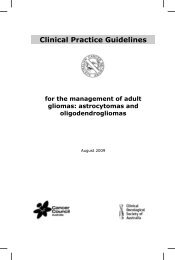Clinical Practice Guidelines for the management of locally advanced ...
Clinical Practice Guidelines for the management of locally advanced ...
Clinical Practice Guidelines for the management of locally advanced ...
You also want an ePaper? Increase the reach of your titles
YUMPU automatically turns print PDFs into web optimized ePapers that Google loves.
Evidence summary Level References<br />
There appears to be a small but significant benefit from adding a<br />
non-steroidal anti-androgen to androgen deprivation <strong>the</strong>rapy. This is<br />
a class effect in favour <strong>of</strong> non-steroidal anti-androgens. In contrast,<br />
<strong>the</strong>re appears to be a detrimental effect with <strong>the</strong> use <strong>of</strong> <strong>the</strong><br />
steroidal anti-androgens.<br />
However, <strong>the</strong> benefit is modest and it required a large number <strong>of</strong><br />
clinical trials to come to this finding.<br />
Recommendation<br />
I & II 6-14<br />
Patients with metastatic prostate cancer may be treated with a non-steroidal anti-androgen<br />
combined with androgen deprivation <strong>the</strong>rapy as a continuing strategy (beyond <strong>the</strong> period<br />
<strong>of</strong> LHRH-induced surge [flare] <strong>of</strong> testosterone) if <strong>the</strong>y are prepared to accept <strong>the</strong> greater<br />
likelihood <strong>of</strong> unwanted effects from combination <strong>the</strong>rapy.<br />
It is recommended that patients with high–volume disease or disease where urgent tumour<br />
debulking is required (eg impending spinal canal compression or urinary outflow obstruction)<br />
be commenced on combined androgen blockade to prevent flare reactions. This required<br />
period is approximately one month <strong>for</strong> an LHRH agonist and covers <strong>the</strong> time it takes <strong>for</strong><br />
testosterone levels to reach a castrate state. Continuation <strong>of</strong> combined <strong>the</strong>rapy beyond<br />
that period may be considered if <strong>the</strong> patient is prepared to accept <strong>the</strong> greater likelihood <strong>of</strong><br />
unwanted side effects from combination <strong>the</strong>rapy.<br />
Grade B<br />
5.1.3 Early versus delayed androgen deprivation<br />
One clinical scenario is <strong>the</strong> <strong>management</strong> <strong>of</strong> patients with radiographic evidence <strong>of</strong> disease without<br />
symptoms. The question arises as to whe<strong>the</strong>r ADTs should be started immediately or delayed until <strong>the</strong><br />
onset <strong>of</strong> symptoms. Two RCTs have addressed this question. These trials took place in different eras.<br />
One trial, VACURG-1, was per<strong>for</strong>med in <strong>the</strong> 1960s and 1970s 15 , while <strong>the</strong> MRC Prostate Cancer<br />
Working Group study was undertaken in <strong>the</strong> 1980s and 1990s. 16 This complicates <strong>the</strong> analysis<br />
because <strong>of</strong>:<br />
issues <strong>of</strong> stage migration and stage detection with pre bone scan and pre PSA era incorporated<br />
with studies <strong>of</strong> patients who are more accurately staged in <strong>the</strong> modern era<br />
different treatments from different eras included oral oestrogens, orchidectomy and LHRH<br />
agonist <strong>the</strong>rapy.<br />
In addition, both studies included men with non-metastatic as well as metastatic disease. As a result<br />
data findings were based on sub-group analyses, and in <strong>the</strong> MRC trial <strong>the</strong> study plan was not always<br />
adhered to, with some controls not receiving treatment on progression.<br />
In both RCTs, no clear survival benefit was shown <strong>for</strong> patients who started castration <strong>the</strong>rapy with<br />
symptoms versus those who started <strong>the</strong>rapy when no symptoms were present. This data set is limited<br />
as <strong>the</strong> VACURG study may have included a proportion <strong>of</strong> patients with symptoms and <strong>the</strong> MRC<br />
study was confounded by some patients in <strong>the</strong> delayed <strong>the</strong>rapy arm not receiving <strong>the</strong>rapy.<br />
This would suggest <strong>the</strong>re is not a mandate to commence ADT in patients with asymptomatic<br />
metastases. It should be noted that <strong>the</strong> MRC and VACURG-1 studies are not <strong>the</strong>rapy versus no<br />
<strong>Clinical</strong> practice guidelines <strong>for</strong> <strong>the</strong> <strong>management</strong> <strong>of</strong> <strong>locally</strong> <strong>advanced</strong> and metastatic prostate cancer<br />
52



